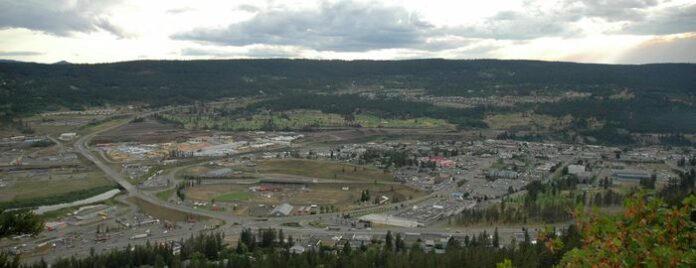A city in B.C.’s Central Interior is taking the unprecedented step of considering a local state of emergency due to public safety and crime concerns.
Williams Lake, which has a population of just over 11,000 people, has been struggling to deal with rising crime and helping those in the community with robust support and treatment services.
At a meeting on May 27, council voted to direct staff to investigate what the city can do in a state of emergency, including putting people into involuntary care if needed.
While law enforcement plays a vital role in public safety, lasting community wellness depends on collaboration from social services, health care, educators and community organizations, council heard in a report from staff.
The six most common risk factors in the community are suspected, unmanaged mental health concerns, lack of appropriate housing, the inability of residents to have their basic needs met, drug abuse or misuse, financial hardship and residents associating with negative peers the report found.
Coun. Scott Nelson, who proposed the motion for the local state of emergency, said change has to happen now.
“There is a theme that is out there and that theme is obviously one that … there’s lots of thefts, there’s assaults on the public, there’s open drug use, there’s fires in the downtown core regularly,” he said.
“There’s public indecency, there’s intoxication, they’re crapping all over the sidewalks, they’re wiping it all over businesses in the downtown core. We’ve had a break-in at the shelter, I think three times now, in the back at the existing Hamilton Inn.
“They’re throwing needles into peoples’ yards where children live, by Hamilton Inn. We opened up the Boitanio Park washrooms here approximately 18 days ago and it’s been burnt three times, it’s been smashed and vandalized on the outside.
“It’s just simply not normal.”

Nelson said the homeless camps in the city have become more dangerous.
“It’s just simply bizarre what’s happening out there and I say this sincerely, I believe in my heart, that these people need a helping hand,” he said.

Get breaking National news
For news impacting Canada and around the world, sign up for breaking news alerts delivered directly to you when they happen.
“When these types of activities are occurring and they’re starting to endanger the lives of other people, and they’re starting to harm the environment that we live in, that puts fear into a community, we can list off all the rights and all the freedoms but those rights, those freedoms, come with duties.”
Nelson said other people need to enjoy those rights and freedoms as well and the city is facing “record numbers” of overdoses and criminal incidents.
“There are people on our streets right now that really don’t care about the laws, that really don’t care about Williams Lake, that really don’t care about what we say and will, quite frankly, burn the city down,” he added.
Nelson said they need to take steps to protect the residents while ensuring that the people who need help get that help.
He advocated for a curfew to be put in place from 11 p.m. to 6 a.m., however, that was voted down by council.
The vote for possibly declaring a state of emergency was not unanimous with some councillors saying it is too extreme and damaging to Williams Lake’s image.
“Do I want to be the municipality that declares a state of emergency for public safety?” Coun. Joan Flaspohler said.
“What is that gonna do for people who want to move here, seniors that see we’re number 17 on the list for retirement community, for people who wanna develop here for economic benefits? That kind of media, I don’t want.”

Coun. Angie Delainey called the motion a reactionary measure and said she would like to see increased patrols or more data-driven examples before enacting a local state of emergency due to crime.
City staff are now investigating what a sweep would look like and what can be implemented based on what the provincial government will allow.
B.C.’s community safety minister says he spoke with Surinderpal Rathor, mayor of Williams Lake on Wednesday morning.
“We’re going to do as much as we can, we’re going to have more concrete plans once we have more direct conversations and the pressing challenges they face,” Minister Terry Yung said.
Williams Lake’s chief administration officer, Gary Muraca, provided details at the council meeting on some recent incidents in the city.
He pointed out that on May 26, two people broke into a business in the downtown area, causing “considerable damage.”
“They were arrested, they were part of the unhoused population,” he said. “They did have ties to Williams Lake, they are from the area.”
Muraca said city staff also dismantled an encampment in the river valley where people were lighting fires and there was a lot of drug activity. He said two people were arrested and six knives were found.
Muraca added that on May 22 and 23, Williams Lake RCMP and emergency health services responded to a record number of calls, including 20 overdose calls and 18 calls for assistance from paramedics.
“This doesn’t include the proactive work that (RCMP) are doing,” he said.
Earlier in the week, he said a man attempted to rob Walmart with a knife and when officers chased the man, they found a stash of stolen goods from the store, spanning weeks.
Muraca also said bylaw officers are spending about 50 per cent of their time dealing with the unhoused population and firefighters are attending to numerous dumpster fires or fires being set at encampments.
“We continue to see way worse vandalism in our parks,” he added. “In our washrooms.” He said that the public works department spent $14,000 in May just dealing with vandalism and clean-up costs.
Muraca said some student employees have also had to be moved out of the parks to another site due to encounters with members of the unhoused community.
“It’s not all of them, it’s a small percentage of the unhoused population,” he said, “but the unhoused population that are doing this sort of stuff are more violent than in years prior.”
The city was one of only 10 selected across Canada to take part in the Canadian Centre for Safer Communities pilot project.
This project aims to inspire local action to foster community safety and well-being through education, knowledge and collaboration.
The survey wrapped up at the end of April and the city will look at the six biggest risk factors facing residents that will inform the next five-year plan.
“We all need to work together,” Rathor said at the meeting.
“We have come a long way but we have a long way to go.”
A local state of emergency gives local authorities the ability to exercise the emergency response powers listed in the Emergency and Disaster Management Act.
They are most often used during emergencies such as wildfires but were also used during the COVID-19 pandemic.
Council can declare a local state of emergency but the provincial government still decides whether or not it meets the criteria.



